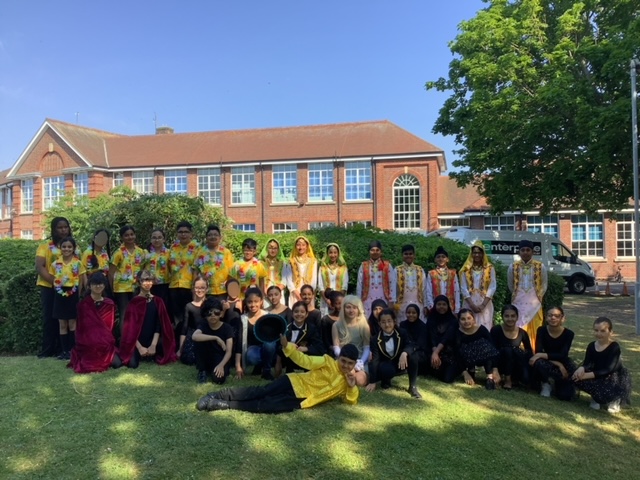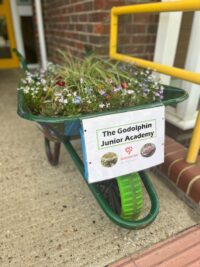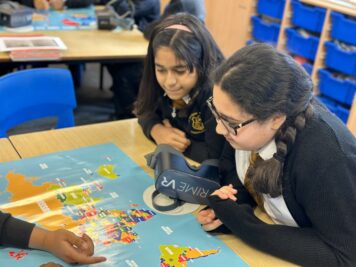Who is IQM?
IQM is the only national inclusion award in the UK. For over 20 years and in over 20 countries, schools, MATs and Local Authorities use the Inclusion Quality Mark to recognise exemplary inclusive practice.
Get in touch for your FREE school information pack today.
Godolphin Junior Academy Achieves Centre of Excellence
June 26, 2023
The Godolphin Junior Academy has achieved the Inclusive School Award with Centre of Excellence status.

‘Meets Needs Not Labels’
Godolphin Junior Academy (GJA) is a 4-form entry school situated in the heart of Slough. The school has started its move towards a 3-form entry school as pupil numbers are decreasing in the area but made the decision to keep 4 classes this year for Year 3 to give the extra support needed. Pupil progress in that year group has been very positive as a result. GJA is a member of the Park Federation Trust. The school serves a diverse multi-cultural area and 39% of its pupils are disadvantaged. Pupils needing SEND support is below average and the Principal says that this is the result of Quality First Teaching. There is a Specialist Resource Base for up to 8 pupils with complex and ASD needs. The clear message from the Principal is that the school does what it takes to meet individual needs and ‘meets needs not labels’. This view is fully supported by staff.
The school’s motto is ‘Godolphin Grows Success’ and it was the pupils who helped to write this. Supporting this are 3 Diamond Rules: Care for everyone and everything; Show respect and good manners at all times; Follow instructions with care and thought.

On the tour our Assessor was struck by how calm the school is. There was much activity in the classrooms but it was managed in a purposeful way. The pupils know the routines of the lessons and this helps them to relax and respond. When answering questions, the pupils stand. This gives importance to what they are saying and the expectation is that they will speak using full sentences. Signals, like putting hand over heads, are also used to show pupil response so that all can participate. Good use is made of talk partners to help support pupils explore and understand their learning, before sharing with the class.
The classroom and corridor displays support and exemplify the work of the school. In classrooms, for example, there is the PSHCE board as well as ‘working wall’ sheets that pupils can use as a reminder whilst working. In the corridor is a Votes for Schools display. Our Assessor had not heard of this initiative and was fortunate to observe Year 6 classes in their Votes for Schools’ lesson. This is when pupils are taught information about different topics and then must vote and decide what their view is. Votes are scanned and sent via the QR code. Examples of previous questions are, Are people more generous in times of need? And Will Science solve the world’s problems? The lessons observed were looking at the issues around the pollution of rivers and the sea by sewage spills.
Now Press Play
An example of how the school aims to develop the learning opportunities for the pupils is Now Press Play. The pupils wear headsets and take part an immersive experience. The lesson observed and listened to was linked to Geography and what the pupils had learnt about the UK. They were part of the adventure and were finding different clues about the UK countries, flying in helicopters to retrieve things. The Digital Lead explained how one module was planned for each term and that new modules were being added. There was no doubt the pupils were enjoying the experience.
It was a real pleasure to see the performance the pupils had given at the Federation Day at the weekend. Real talent was on show from acting to comedy, dance, magic and music. The steel band was a first for our Assessor on a visit to a primary school and the whole performance exemplified the desire of staff to develop and extend the pupils’ experience. This performance had taken a lot of time and rehearsal for both staff and pupils but it was worthwhile.

Reading is at the centre of the curriculum and The Power of Reading approach is used. There is additional support for reading as well as clear reading activities in class lessons. Phonics groups take place and then there is reading support through reading partners. The reading specialist is based in the library and she spoke about how all staff are involved, including office staff. The groups take place 3 times a week, progress is recorded and pupils complete quizzes. Results are stored and shared with staff. Class teachers are then fully aware of the progress of the pupils in their class.
Sharing of information is a real strength of the school. The Inclusion Lead and Deputy SENDCo demonstrated how all information about pupils is stored on their database which is accessible for staff. Provision Map is used to store records of all interventions, current and past, as well as reports and letters from outside agencies. Teachers explained how useful this was for them. Staff then have access to up-to-date information about pupils and can use this to plan and prepare resources.
Staff are further supported by the regular meeting of the Inclusion team. The team is a multi-disciplinary group of staff who meet every lunch time to discuss the needs of each year group. Teachers are invited to join and it is an opportunity to raise concerns about learning, behaviour, or need. The concerns are discussed, solutions offered, then reviewed, next steps discussed in a solution circle approach. This is added to Provision Map so that information is live.
Calm and Serene
GJA is fortunate to have the space to create rooms where different interventions can take place. The Oasis Room is calm and serene and this is where the Learning mentor works and where ELSA and other mental health interventions take place. In the Spring Room our Assessor saw a TA leading a phonics intervention and she had a new TA shadowing her. The Greenhouse is where Speech and Language and EAL interventions take place. Then there is the Ocean room which is the resource base. It has a sensory room that pupils can use as well as a pupil kitchen. In the morning the focus is on maths, reading and writing whilst the afternoon tends to focus on social skills. Zones of Regulation are used here and assessment for learning is used. Pupils have individualised programmes and one pupil is following a reduced timetable.
The pupils are enthusiastic about their time in school and were able to share what was important to them. Staff are very supportive and teachers make learning fun. They explained they liked how the learning linked concepts together from different subjects, how important celebration assemblies are, that if they feel sad, they are able to speak to people about this. The Year 5 and 6 pupils further highlighted how their mental health is supported. Staff had told our Assessor about the school’s aims in these areas and the pupils were aware, thus demonstrating the effectiveness of the school’s work.

There are a wide range of leadership opportunities open to the pupils, Head Boy and Head Girl (2 boys and 2 girls now as it was noted that ‘deputies’ did not really have much to do), digital champions, young leaders and active ambassadors to name a few. Pupils were able to speak eloquently about these roles as well as describing the range of clubs open to them and the visits and trips they go on. They understand about the Childhood Promise and know that they are given opportunities that they would not always encounter themselves. There is so much that works alongside the curriculum to support and develop the pupils. Pupil voice is a real strength of the school.
No Child Falls Through the Net
Teachers explained that no child falls through the net because of the strength of the information shared by all staff and that the school ensures that every child gets the best start. It is natural for them to adapt their practice so that all pupils are included. They spoke about the Power of 3 and how they use IRIS to film their lessons and then discuss together. This they said does not create pressure but helps them to develop as practitioners. Much has been done to support work/life balance and the no emails after 6 and at weekends was mentioned. A TA did say that if they needed support, they could reach out and contact the Principal at this time. A teacher spoke about how the Principal had offered to do her marking for her. The wellbeing pot is really appreciated. This is when one person is nominated and they are given an extra 15 minute break as well as goodies. What staff really appreciated about this was that it covered all staff in the school and so is fully inclusive.
The TAs said how supportive the staff were and were always ready to help. One said that she has arrived for one day of supply but had never left. They recognise that the school is run by a strong team and that they can go to managers who will always have time for them. They said that everything is about the children and that the friendly family environment supports the interventions that they run. The TAs are given opportunities to develop their skills and grow and progress.
Parents are supported and listened to and they said they were never ‘palmed off’. They regularly receive information via the weekly newsletter, Monday memos, website calendar and the school app. The teachers are very supportive and real praise was given to the office team who are always positive, supportive and ready to help. Parents too are aware of the breadth of experience that is open to their children as well as the wide range of support that is offered.
Diversity in the Curriculum

The governors are fully aware of, and support, the school’s work on inclusion. They know about the diversity in the curriculum, the understanding there is of different needs and the respect that children have for each other. They believe that the staff go above and beyond to meet individual need. They spoke about how the minibus is used to support families and pupils facing challenging times and how clubs are accessible for all. The governors visit the school regularly and are involved in curriculum reviews.
Our Assessor concluded, “During the 2 days that I visited the school, I just kept finding more and more information about the school’s inclusive practices, so much so that it was hard to decide what to include in this report.
“There is no doubt that inclusion is a golden thread that runs through the work of the school. Children and adults are valued and respected and the children demonstrate acceptance and tolerance. Positive encouragement and reinforcement are modelled by all staff. Mental health and well being is given real prominence and I would like to thank the staff who supported me during my visit, ensuring that all was well with me. I have no hesitation in recommending the school for the Inclusive School Award as it more than meets the criteria.”
Find out more about the IQM Inclusive School Award
If your school is interested in obtaining the IQM Inclusive School Award or you wish to talk to a member of the IQM team please telephone:
028 7127 7857 (9.00 am to 5.00 pm)
or email: info@iqmaward.com for further details.
Want more information on the IQM Award? Click here to request your free IQM information pack.
Other Posts

About IQM
The only national award for inclusion in the UK, IQM has been committed to recognising exemplary inclusive schools for over 20 years and in over 20 countries around the world. The three awards allow schools and organisations to celebrate their inclusive practice against nationally recognised framework.
Site Links
© 2026 Inclusion Quality Mark | website developed & cared for by digidoda


